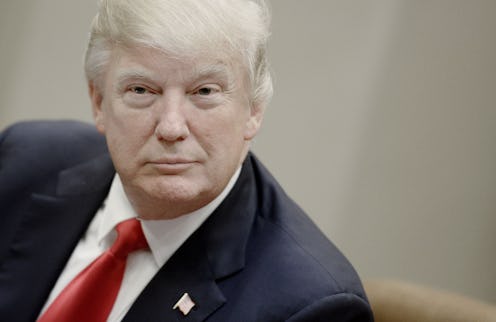News
Trump Got A High Score On A Psychopath Test

On Friday, Keith Olbermann reiterated a question that's been posed countless times over the last two years: Is Donald Trump a psychopath? After applying a commonly-used clinical tool for diagnosing psychopathy to the president, Olbermann concluded that yes, the president is probably clinically psychopathic. For critics of the president, this is a very tempting conclusion to draw. But it's a temptation we should resist.
Much of our common understanding of psychopathy comes from Dr. Robert Hare, a well-respected pioneer in the field who's been researching the topic since the 1970s. According to Hare, psychopathy is defined not by one specific attribute, but rather "a distinctive cluster of behaviors and inferred personality traits, most of which society views as pejorative." Hare developed the Hare Psychopathy Checklist in the 1970s as a tool for clinicians, and it's still used today. There are several different versions of it; the one Olbermann used was PCL-R, the original and most thorough of them all.
PCL-R has 20 questions, each of which address a different behavioral or personality trait that's indicative of psychopathy. Such trains include superficial glibness or charm, an inflated sense of self-worth, lack of remorse or guilt, refusal to accept responsibility, callousness and lack of empathy, manipulative behavior, and so on (you can find the full list here). If respondents score high enough on the test, they are most likely a psychopath— and according to Olbermann, Trump scored more than high enough.
There's just one problem: Olbermann isn't a psychologist, and isn't qualified to make such a diagnoses. The Psychopathy Checklist may seem straightforward, but Hare himself has explicitly warned against using it to make the kind of armchair diagnoses that Olbermann is making.
"The potential for harm is considerable if the PCL-R is used incorrectly, or if the user is not familiar with the clinical and empirical literature pertaining to psychopathy," Hare writes on his website.
He says that anyone using the checklist to make a diagnoses should "possess an advanced degree in the social, medical, or behavioral sciences, such as a Ph.D., D.Ed. or M.D." They should also "be registered with the local state or provincial registration body that regulates the assessment and diagnosis of mental disorder." Nobody should attempt to use the psychopath checklist unless they "have experience with forensic populations (as demonstrated by registration as a diploma in forensic psychology or psychiatry, completion of a practicum or internship in a clinical-forensic setting, or at least two years of relevant work-related experience)," and so on. Needless to say, Olbermann doesn't fulfill those qualifications.
But what about people who do? That's a different question entirely, and there is in fact a debate within the psychiatric community about whether or not professionals ought to be diagnosing Trump with mental illness from afar. Many believe the answer is no, citing the community's longstanding tradition of refusing to make diagnoses of public figures without personally examining them. Others, convinced that Trump does have a mental illness, believe that the stakes are simply too high (nuclear war, etc.) to remain silent.
That's a debate for the psychiatric community to resolve. But if even professionals who've been trained in making such diagnoses are reluctant to weigh in on Trump's mental health from afar, it's certainly not valid for folks with no expertise whatsoever on the subject to do so. Olbermann is free to say whatever he wants, of course, but we shouldn't mistake that for a professional diagnoses.
It's entirely possible that Trump is a psychopath. But that's a judgement for professionals to make.